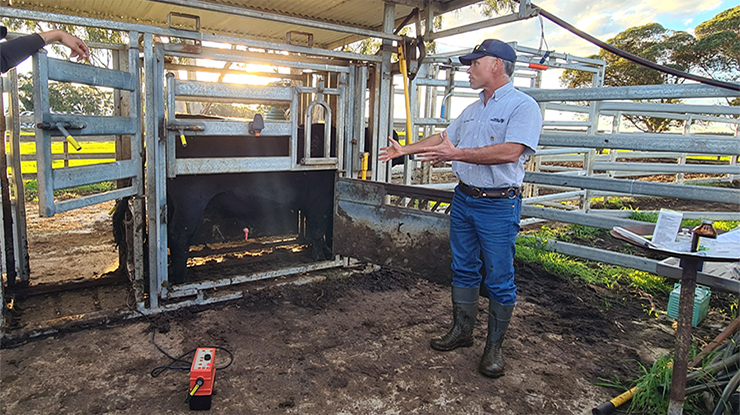Beware of bull breakdown this sale season
30 May 2024
 Dr Enoch Bergman demonstrates a bull breakdown investigation.
Dr Enoch Bergman demonstrates a bull breakdown investigation.
Key points:
- Data is revealing steps producers can take that may reduce the risk of bulls breaking down.
- A lack of preparation for balanoposthitis could have a severe economic impact on your business.
With this year’s bull sales underway, as with any investment, it’s important to consider how to best protect assets and maximise productivity.
When it comes to bulls, particularly virgin bulls, one of the largest threats is balanoposthitis – or inflammation of the penis and prepuce.
Affected bulls often progress to catastrophic preputial and penile injury if they aren’t removed from the mating group.
The potential cost to a beef business if bulls are affected by balanoposthitis depends on:
- the time of onset of the syndrome
- the amount of time until producer recognises it and takes action
- access to replacement bulls
- sale and salvage value of affected bulls.
At best, a producer may have time to replace an affected bull during the joining season if the bull is identified early.
This will come with the added expense of acquiring a new bull and disruption to joining.
However, if the bull’s condition is identified late in the season, producers will likely see a higher proportion of animals tested empty at pregnancy testing time which will disrupt the breeding rate and more calves will be born late in the calving season.
What’s the solution?
MLA is investing in a three-year Producer Demonstration Site (PDS) project aimed at preventing bull preputial breakdown, in partnership with the WA-based producer group, ASHEEP & BEEF. The aim is to demonstrate the success of prevention of balanoposthitis by vaccination in the South Coast region of WA.
The project’s lead producer Simon Fowler said prior to the research, producers were already using vaccination to diminish the risk.
“Local producers have been vaccinating bulls for over ten years and have anecdotally seen a large reduction in balanoposthitis,” Simon said.
“I certainly expect the PDS to show a more significant reduction in injuries to vaccinated bulls.”
Surveys were conducted across 48 properties, with survey participants giving an average score of 9.5 out of 10 when asked if they believe vaccination helps in the prevention of bull preputial breakdown.
On properties where bulls were unvaccinated, 20.5% of the virgin bulls broke down during joining, with 17.4% being due to balanoposthitis.
Where vaccination had occurred on properties, 13.4% of the virgin bulls broke down, 12.9% of which was attributed to balanoposthitis.
Throughout the research process, the following observations were made:
- Exposing virgin bulls to sexual experience (commingling with cull cows) prior to joining may help reduce the incidence of balanoposthitis.
- Wet conditions may contribute to the incidence and severity – 45.2% of producers who reported no virgin bull breakdowns reported wet conditions whilst 64.7% of those who reported virgin bull breakdowns reported wet conditions.
MLA is continuing the research with aims to increase the sample size though more properties and collect data from producers following pregnancy testing and the calving season.
This should offer more thorough data on the impact of balanoposthitis and methods of prevention.
|
Three tools to get more bang for your buck this bull sale season
|


